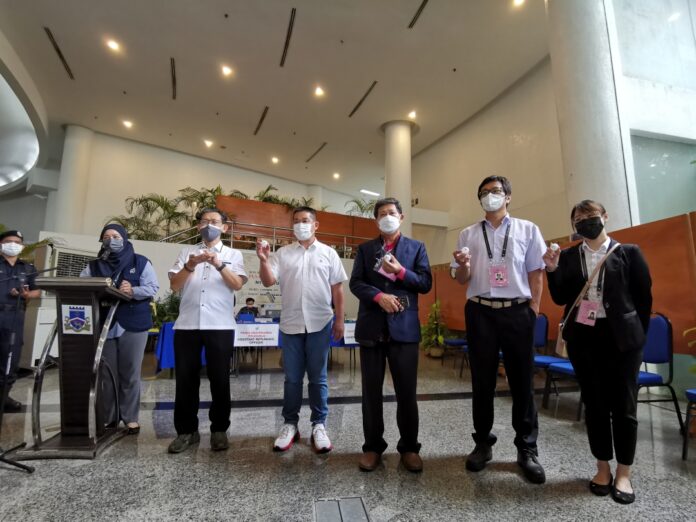(From left) Batu Lintang candidates Sih Hua Tong, See Chee How, Voon Lee Shan, Alex Leong and Cherishe Ng pose for the cameras. — Picture via Borneo Post
KUCHING, Dec 17 — The Batu Lintang constituency might look small on paper, but it is actually one of the most hotly contested seats in the Sarawak election, with almost 30,000 voters who will choose their state assemblyman tomorrow.
The urban settlement is also diverse with low-cost housing, middle-class abodes as well as a few squatter areas with a small mix of Iban, Bidayuh, Malay, and even a little Indian population living in harmony with the 80 per cent Chinese voters.
While most areas near Kuching district are seen to be safe for incumbent parties, the dynamics in Batu Lintang is different.
Incumbent See Chee How, who won the seat in 2011 and 2016 on a PKR ticket, is now with the “new” Sarawak Opposition party Parti Sarawak Bersatu (PSB) who loudly opposes the powerful Gabungan Parti Sarawak (GPS).
See will be up against his opponent from GPS component Sarawak United People’s Party’s (SUPP) Sih Hua Tong — who lost twice previously when he contested against See.
See’s former party PKR is now represented by 24-year-old law graduate Cherishe Ng whose team is led by her father, See’s former teammate and previously Padungan state assemblyman Dominique Ng.
Yet another rival is Parti Bumi Kenyalang (PBK) president Voon Lee Shan who was responsible for ending SUPP and Barisan Nasional (BN)’s 15-year reign in Batu Kitang, when he won with a DAP ticket in 2006.
Making up the five corner fight is Sarawak People’s Aspiration Party (Aspirasi) candidate Alex Leong.
Although campaign efforts have been lukewarm so far with Covid-19 Standard Operating Procedures (SOPs) put forth by the Election Commission (EC), effectively banning face-to-face campaign and political ceramah, posters littering the area suggested otherwise.
“Batu Lintang has always been a place where voters expressed themselves. We voted for an Opposition politician in 2006, before the wind of change spread in 2011,” said Benjamin, a 60-year-old shop owner in Maong recalling the 2011 state election when the Opposition won 15 seats.
His friend, who wanted to be only identified as Chee, agreed with him saying that voters will look at parties more than the candidates.
“PKR is the Opposition party who has contested here since 2011, I think they have a chance if the party and candidate work hard,” the 58-year-old businessman added.
However, some voters think that See — who is one of the more familiar faces to the voters — might have a better chance.
Angie Soh from Tabuan Jaya said See’s contributions for the last 10 years have allowed him to have a better connection, especially when candidates are now left with no choice but to do their ceramahs online, rather than face to face.
“The candidates can only visit public areas now, not many voters can see them face to face. That is why I think See Chee How is more familiar to the voters of Batu Lintang and that might help him to win,” said the 40-year-old solicitor.
Most other voters however kept their cards close to their chest, saying that their choices will be made when the ballot is thrown on December 18.
“Voting for the party and voting for the person is actually two different things. We have to choose what is best for our constituents,” said Mark Teh, who returned to vote from Kuala Lumpur.
In 2006, Voon scored an upset, defeating SUPP’s three-time assemblyman Chan Seng Kai who was then the Kuching Selatan Mayor with a 3,407 majority. He was then with DAP.
In 2011, Voon was dropped when the constituency was given to PKR which saw See defeat Sih with a majority of over 8,000 votes, garnering 72 per cent of the votes.
However, in 2016, Sih managed to reduce See’s majority to 4,385 with the latter’s vote percentage going down to 61.61 per cent.


